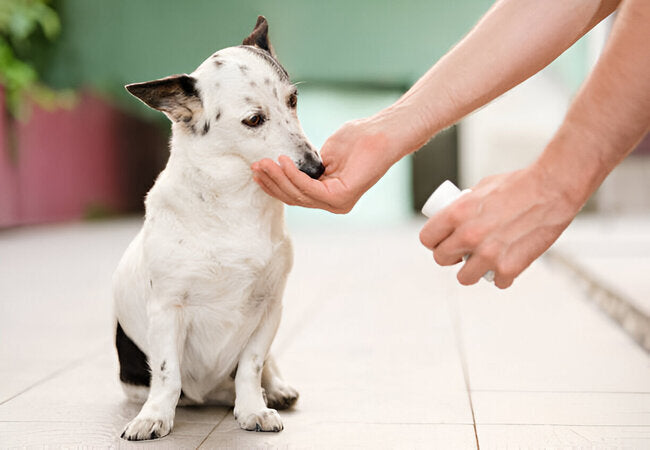Can Benadryl Help with Dog Anxiety in 2025 – Vet‑Approved Guide to Safe Relief 🐶💊

In this article
Can Benadryl Help with Dog Anxiety in 2025 – Vet‑Approved Guide to Safe Relief 🐶💊
By Dr. Duncan Houston BVSc
Many pet owners consider using over-the-counter Benadryl to calm their anxious dog. But is it truly helpful—or just a harmless sedative? As a veterinarian, I’ll walk you through the science behind Benadryl (diphenhydramine), its real-world effects on anxiety, safe dosing, potential risks, and superior strategies for managing canine stress in 2025. Let’s make informed, compassionate decisions together. 🧠🐾
1. 🧪 What Is Benadryl (Diphenhydramine)?
Benadryl is the brand name for diphenhydramine, a first-generation H1-antihistamine commonly used to treat allergies, motion sickness, insomnia, and mild anxiety in humans—and often in dogs as well. It's legal over-the-counter and accessible in tablet or liquid form.
- Antihistamine effect: Blocks histamine to reduce itching, sneezing, swelling.
- Sedative effect: Crosses the blood–brain barrier to cause drowsiness in dogs and humans.
- Anticholinergic effects: Can cause dry mouth, urinary retention — effects are more notable with high doses.
Because of its sedative properties, many believe Benadryl will simply “quiet” an anxious dog. But sedation is not equivalent to treating core anxiety, and may mask symptoms without resolving the underlying stress.
2. 🚩 Does Benadryl Help with Anxiety?
While Benadryl may help some dogs feel drowsy and mildly calmer (like “a glass of milk before a flight” analogy), its ability to address true anxiety is limited:
- It provides only mild sedation; animal responses are inconsistent.
- No strong evidence supports its use for separation anxiety, phobias, or emotional distress.
- Some dogs may react paradoxically with hyperactivity or restlessness.
In short, Benadryl is not a reliable anti-anxiety medication—it may help a bit for travel or noise-related stress, but it doesn’t address deeper emotional issues.
3. 🧮 Safe Dosage & Administration
If your vet approves, Benadryl can be dosed:
- Typically 1 mg per pound (2–4 mg/kg) of body weight, given every 8–12 hours.
- Maximum safe dose: 1 mg/lb per dose, up to 3 times daily.
- Give with food to reduce stomach upset and enhance absorption.
- Only use plain diphenhydramine—avoid extra active ingredients like decongestants or sweeteners.
Example: A 30‑lb dog would need a 30 mg tablet of plain Benadryl every 8–12 hours (max 90 mg/day).
Important: Always verify the proper form and dosage with your veterinarian before administering. Health conditions such as glaucoma, heart issues, urinary problems, and hypertension may make Benadryl unsafe for some dogs.
4. ⚠️ Recognizing Side Effects & Risks
Though generally safe, Benadryl can cause undesirable effects:
- Sedation, lethargy—can interfere with alertness or coordination.
- Hyperactivity, restlessness are seen in some dogs.
- Dry mouth, urinary retention, and constipation from anticholinergic effects.
- Digestive upset—vomiting or diarrhea may occur.
- Severe overdose risks—including seizures, coma, fast heartbeat, and respiratory distress. Too much can be fatal.
Monitor closely after dosing—any abnormal behavior, vomiting, extreme drowsiness, or aggression requires immediate veterinary attention.
5. 🐶 When Is Benadryl Appropriate?
Benadryl may be useful in:
- Mild motion or travel anxiety: For short trips or stressful travel, sedation might help the dog's comfort.
- Mild situational anxiety: Situations like vet visits or grooming, though it's not ideal as primary treatment.
- Allergy or insect bite relief: The Primary benefit is antihistamine action—any calming effect is secondary.
Benadryl should not be used alone for separation anxiety, storm phobia, or generalized anxiety—it doesn’t address underlying triggers.
6. ✅ Vet‑Recommended Anxiety Management
Instead of relying on Benadryl, veterinarians often recommend a layered, vet-approved treatment plan:
📋 6.1 Behavioral Modification
- Desensitization and counter-conditioning to reduce triggers
- Crate training and “safe spaces” to build calm routines
- Positive reinforcement for confident behaviors
💊 6.2 Veterinary‑Grade Medications
- Trazodone, fluoxetine, clomipramine, alprazolam—prescribed medications shown to reduce anxiety.
- Gabapentin for noise phobia or medical anxiety.
🧴 6.3 Adjunctive Aids
- Pheromones: Adaptil or dog‑appeasing products can support calm behavior.
- Supplements: Zylkene, Calmex, and L‑theanine support mild anxiety relief.
- Structured exercise: Regular activity boosts mental health and reduces anxiety triggers.
7. 📝 Real‑Life Case Examples
“On a long drive, Max got drowsy after vet-approved Benadryl—helping him stay calm but not solving his motion sickness issues. Now we pair it with training and holidays safe-zone.”
“Sparky was terrified of fireworks. Benadryl alone didn’t help. But a combination of trazodone, Adaptil diffuser, and sound desensitization worked wonders.”
8. 📊 Quick Reference Table
| Situation | Benadryl Effect | Better Option |
|---|---|---|
| Motion anxiety (car) | Mild sedation | Travel training + gabapentin |
| Storm/fireworks phobia | Often ineffective | Alprazolam + desensitization + Adaptil |
| Separation anxiety | Unhelpful | Clomipramine + behavior plan |
| Insect allergy | Good antihistamine | + topical care + vet follow-up |
9. 📱 Ask A Vet App 2025 Support
Need expert guidance?
With the Ask A Vet app you can:
- 📹 Upload anxiety behavior videos for vet assessment
- 🧠 Get safe dosing advice and medication alternatives
- 💬 Consult behaviorists for comprehensive training plans
Instant access helps ensure your dog gets both safe and effective care. 🐾📲
🔟 ❤️ Final Thoughts
Benadryl may CALM, but it rarely CALMS. As a vet-approved medication, it can provide mild sedation in low-stress contexts like travel or grooming—but it’s not a substitute for proper anxiety treatment. In 2025, we choose compassion, evidence, and safety: vet-approved behavior plans, medications designed for anxiety, enrichment, and careful training. Use Benadryl wisely—and always under professional guidance. 🐶💊
Need tailored anxiety support? Visit AskAVet.com or download the Ask A Vet app to get personalized treatment plans and expert care for your dog.






